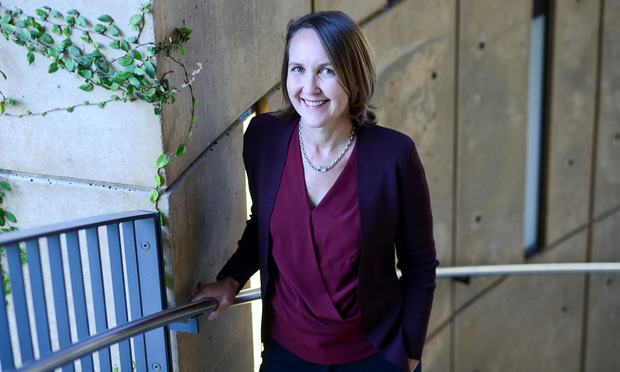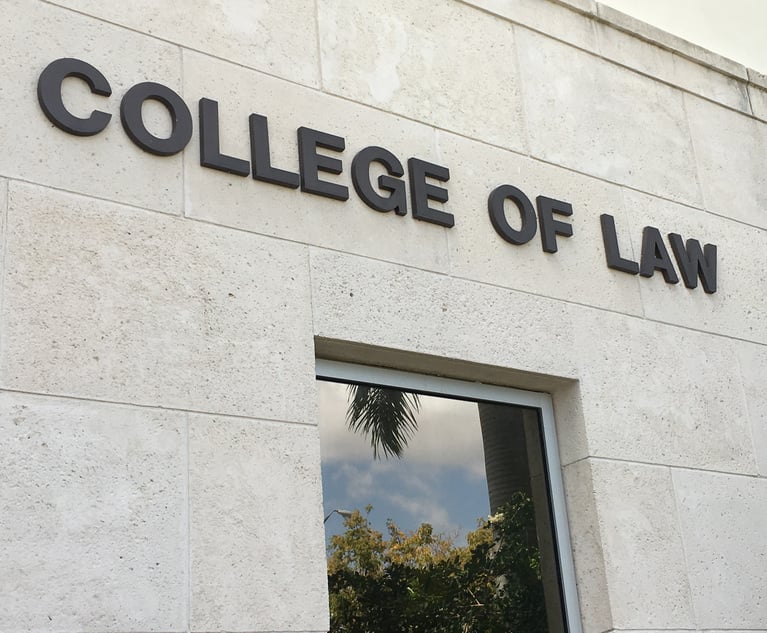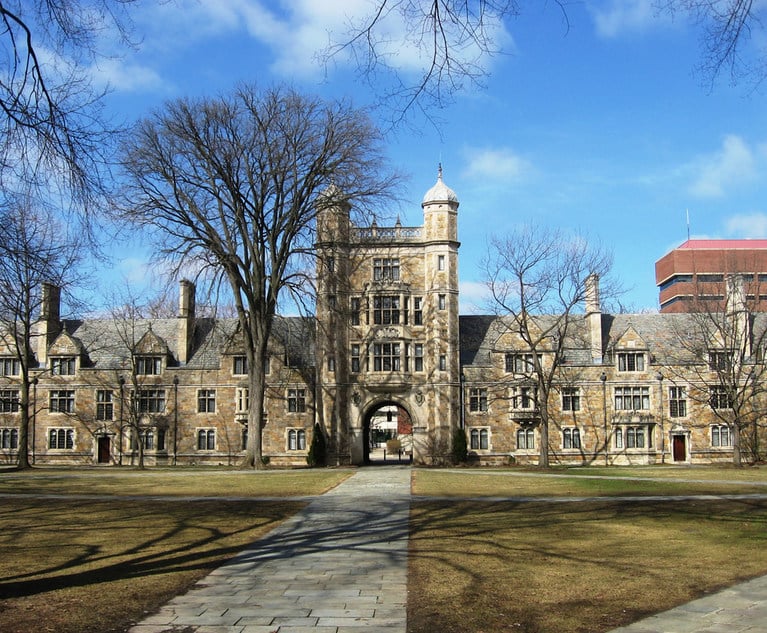Stanford Names Jenny Martinez as Next Law Dean
The human rights scholar has been on the Stanford Law faculty since 2003 and recently led an effort to bolster diversity and inclusion on the law campus.
February 06, 2019 at 06:11 PM
3 minute read
The original version of this story was published on The Recorder
 Jenny Martinez.
Jenny Martinez.
Longtime faculty member Jenny Martinez has been named the next dean of Stanford Law School.
University officials announced Wednesday that Martinez will succeed outgoing dean Elizabeth Magill, who is leaving the dean's office after seven years to become provost of the University of Virginia. Martinez—an expert on the impact of courts on human rights who has been on the Stanford Law faculty since 2003—will assume that post April 1.
“She has deep support from her faculty colleagues, students and staff for both her scholarship and her leadership,” said Stanford Provost Persis Drell in an announcement of the appointment. “She brings an enthusiasm for the future of Stanford Law School and she will be a great addition to the senior leadership of the university.”
Martinez—who is Hispanic—will join the growing number of women occupying the dean suites in law campuses across the country, particularly minority women. Women now comprise about a third of deans at ABA-accredited law schools, and that percentage continues to rise.
She served as the law school's associate dean for curriculum from 2013 to 2016 and last year chaired the school's working group on diversity and inclusion. That group issued a slew of recommendations, including the creation of a diversity cabinet; more outreach to prospective and admitted students, and the creation of a speaker series centered on bias and identity.
“Jenny Martinez is not only an exceptional scholar and gifted teacher, but has been a spectacular citizen at the law school who has played a pivotal role in the school's important recent initiatives on promoting diversity and inclusion, and providing path-breaking global learning opportunities for our students,” said law professor Jane Schacter, who was co-chair of the dean search committee.
Martinez graduated from Harvard Law School and went on to clerk for two of the biggest names in the federal judiciary: Judge Guido Calabresi of the U.S. Court of Appeals for the Second Circuit and U.S. Supreme Court Justice Stephen Breyer. Martinez on Wednesday called the opportunity to lead the law school an honor.
“Through my work in international and comparative law, “I have seen how important law is to building societies where everyone is treated fairly and all kinds of human endeavors can flourish,” she said. “Through innovative research and teaching, in collaboration with other departments in the university, Stanford Law School is uniquely situated to contribute to solving public policy problems and training lawyers for the future.”
This content has been archived. It is available through our partners, LexisNexis® and Bloomberg Law.
To view this content, please continue to their sites.
Not a Lexis Subscriber?
Subscribe Now
Not a Bloomberg Law Subscriber?
Subscribe Now
NOT FOR REPRINT
© 2025 ALM Global, LLC, All Rights Reserved. Request academic re-use from www.copyright.com. All other uses, submit a request to [email protected]. For more information visit Asset & Logo Licensing.
You Might Like
View All
Florida Law Schools Are Seeing a Bump in Applications for 2025, After Recent Declines at Flagship Schools
3 minute read

Law School Applications are Up Across the Country. Law Deans Aren't Sure Why
6 minute read
Librarian's Termination Violated First Amendment Protections, Lawsuit Claims
3 minute readTrending Stories
- 1With DEI Top of Mind, Black Judges Discuss Growing Up During Segregation, Efforts to Diversify the Profession
- 2Big Law's Middle East Bet: Will It Pay Off?
- 3'Translate Across Disciplines': Paul Hastings’ New Tech Transactions Leader
- 4Milbank’s Revenue and Profits Surge Following Demand Increases Across the Board
- 5Fourth Quarter Growth in Demand and Worked Rates Coincided with Countercyclical Dip, New Report Indicates
Who Got The Work
J. Brugh Lower of Gibbons has entered an appearance for industrial equipment supplier Devco Corporation in a pending trademark infringement lawsuit. The suit, accusing the defendant of selling knock-off Graco products, was filed Dec. 18 in New Jersey District Court by Rivkin Radler on behalf of Graco Inc. and Graco Minnesota. The case, assigned to U.S. District Judge Zahid N. Quraishi, is 3:24-cv-11294, Graco Inc. et al v. Devco Corporation.
Who Got The Work
Rebecca Maller-Stein and Kent A. Yalowitz of Arnold & Porter Kaye Scholer have entered their appearances for Hanaco Venture Capital and its executives, Lior Prosor and David Frankel, in a pending securities lawsuit. The action, filed on Dec. 24 in New York Southern District Court by Zell, Aron & Co. on behalf of Goldeneye Advisors, accuses the defendants of negligently and fraudulently managing the plaintiff's $1 million investment. The case, assigned to U.S. District Judge Vernon S. Broderick, is 1:24-cv-09918, Goldeneye Advisors, LLC v. Hanaco Venture Capital, Ltd. et al.
Who Got The Work
Attorneys from A&O Shearman has stepped in as defense counsel for Toronto-Dominion Bank and other defendants in a pending securities class action. The suit, filed Dec. 11 in New York Southern District Court by Bleichmar Fonti & Auld, accuses the defendants of concealing the bank's 'pervasive' deficiencies in regards to its compliance with the Bank Secrecy Act and the quality of its anti-money laundering controls. The case, assigned to U.S. District Judge Arun Subramanian, is 1:24-cv-09445, Gonzalez v. The Toronto-Dominion Bank et al.
Who Got The Work
Crown Castle International, a Pennsylvania company providing shared communications infrastructure, has turned to Luke D. Wolf of Gordon Rees Scully Mansukhani to fend off a pending breach-of-contract lawsuit. The court action, filed Nov. 25 in Michigan Eastern District Court by Hooper Hathaway PC on behalf of The Town Residences LLC, accuses Crown Castle of failing to transfer approximately $30,000 in utility payments from T-Mobile in breach of a roof-top lease and assignment agreement. The case, assigned to U.S. District Judge Susan K. Declercq, is 2:24-cv-13131, The Town Residences LLC v. T-Mobile US, Inc. et al.
Who Got The Work
Wilfred P. Coronato and Daniel M. Schwartz of McCarter & English have stepped in as defense counsel to Electrolux Home Products Inc. in a pending product liability lawsuit. The court action, filed Nov. 26 in New York Eastern District Court by Poulos Lopiccolo PC and Nagel Rice LLP on behalf of David Stern, alleges that the defendant's refrigerators’ drawers and shelving repeatedly break and fall apart within months after purchase. The case, assigned to U.S. District Judge Joan M. Azrack, is 2:24-cv-08204, Stern v. Electrolux Home Products, Inc.
Featured Firms
Law Offices of Gary Martin Hays & Associates, P.C.
(470) 294-1674
Law Offices of Mark E. Salomone
(857) 444-6468
Smith & Hassler
(713) 739-1250








